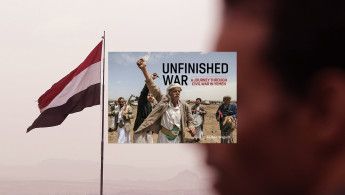Unfinished War: A Journey Through Civil War in Yemen through Asmaa Waguih's eyes
For the past decade, Yemen has been in the grips of a civil war, the country torn apart and its people suffering.
The UN estimated that by the start of 2022, 377,000 people had died as a result of the violence; 60% of those deaths were attributed to indirect effects like hunger, unsafe water, and a lack of access to healthcare.
Now, in a new book titled Unfinished War: A Journey through Civil War in Yemen, Egyptian-born war photographer Asmaa Waguih brings a unique perspective from inside the conflict.
With over 150 photographs, Asmaa showcases both the dark and light of this war, from fighters barely old enough to grow facial hair to grain merchants, fishermen, and even a game of football amidst the rubble of 2,000-year-old buildings.
“From an early age, I was always interested in reporting, but I didn’t necessarily think I would go into photography,” Asmaa reflects, recalling her journey to the front line.
“I started writing articles when I was younger, but photography was just a hobby. I began carrying my camera with me while reporting to illustrate my pieces.”
Working as a freelancer in her early 20s, it wasn’t until Asmaa started reporting from Iraq in 2003 that she began to see photography in a new light, meeting full-time professionals from both the West and the Middle East.
“I felt something was missing in my work. Photography and photojournalism are art forms. Instead of just reporting how many people died or were injured, you’re placing that in a visual context.”
As Iraq became more dangerous, Asmaa began shooting indoors to keep a low profile. She captured images of young girls lifting weights with their trainer to the soundtrack of car bombs.
It was in this environment that Asmaa truly began to consider herself a journalist, learning about safety and security in the midst of a war-torn country.
Asmaa found stories everywhere in Iraq, inspiring her to upgrade her equipment and “get out and work.” She travelled to Lebanon, Gaza, and back to Egypt, her work eventually taking her to Yemen in 2016.
On her first visit, the Houthis told her to leave quickly, so Asmaa redirected and shot in pro-government areas.
During each subsequent visit, she discovered new areas she felt compelled to explore, hearing stories from all angles about which factions and powers should be in control.
“Yemenis are so accustomed to war; this proxy war has prolonged everything. I see their suffering in every part. Everyone wants something from this war, whether it’s oil or ports; it’s all about control. It’s not about religion.
"After all this war, after all this money, after all these lives lost, nothing has changed,” she adds.
The book serves as a reminder to not forget humanity in war, a message often more powerfully portrayed through imagery.
“It’s a cliché, but a picture says a thousand words. Every aspect of reporting is crucial, especially video for the courts, but a photo is silent," says Asmaa.
"It’s very intense and concentrated.”
She recalls one moment in particular alongside some Kurdish girls who proudly carried guns. “They were proud to fight for a Kurdish area, and this one photo of this one girl can speak for all the Kurdish people,” Asmaa explains.
Through persistence, Asmaa has made her way to the front lines many times, often working with local fighters to gain access.
It’s perhaps not surprising that some of the people she photographed have since lost their lives.
“A Tihama commander I interviewed was killed by a landmine a few days after we spoke,” she remembers.
In Iraq, talking about the numbers of injured and dead became normal for Asmaa, but through her photography, those deaths hit harder.
While she was physically injured during her work, Asmaa experienced PTSD due to the effects of witnessing war.
“Sometimes things pile up and you don't feel it. It just happens all of a sudden, getting out of control. I took a photograph of someone shooting a man in Syria, and at the time I didn’t feel anything. I was just doing my work," she recalls.
"Maybe it’s not all the things that are happening, but how they affect you as a human and your relationships with others. You can endure and endure, and then suddenly there’s a collapse.”
Regarding what Asmaa wants people to understand about her work, it’s that the Middle East isn’t just being torn apart internally.
“There is foreign intervention. When the West supports some groups over others, any long-term oppression can breed terrorism; it’s an act of violence.
"You can be a very ordinary person, but politics and oppression can turn you into a terrorist.”
She observed a similar situation in Afghanistan, where marines would traverse crop fields to avoid enemy fire, inadvertently destroying farmers’ land and livelihoods.
“Initially, people complained about the Taliban. However, when marines began patrolling and accidentally killing people, farmers started pointing out Americans from their windows.
"Once, while crossing with a sergeant, a farmer said ‘Woah woah woah!’ Clearly worried about his land, the soldier just replied, ‘What’s up, man?’” Asmaa laughs. “What’s up? We’re destroying his land!”
In the face of trauma, sometimes laughter is necessary to make it through.
Unfinished War: A Journey through Civil War in Yemen is out now.
Isabella Silvers is a multi-award-winning editor and journalist, having written for Cosmopolitan, Women's Health, Refinery 29 and more. She also writes a weekly newsletter on mixed-race identity, titled Mixed Messages
Follow her on Twitter: @izzymks




 Follow the Middle East's top stories in English at The New Arab on Google News
Follow the Middle East's top stories in English at The New Arab on Google News


